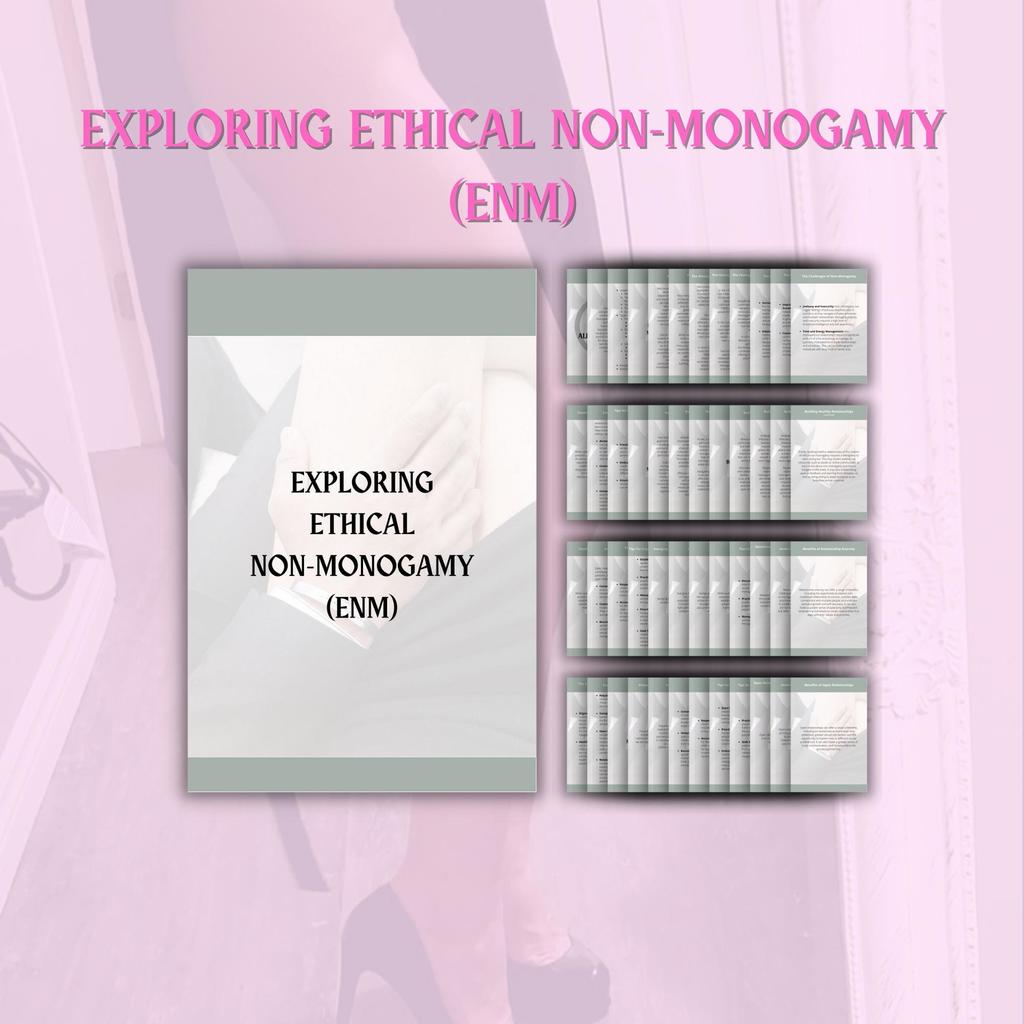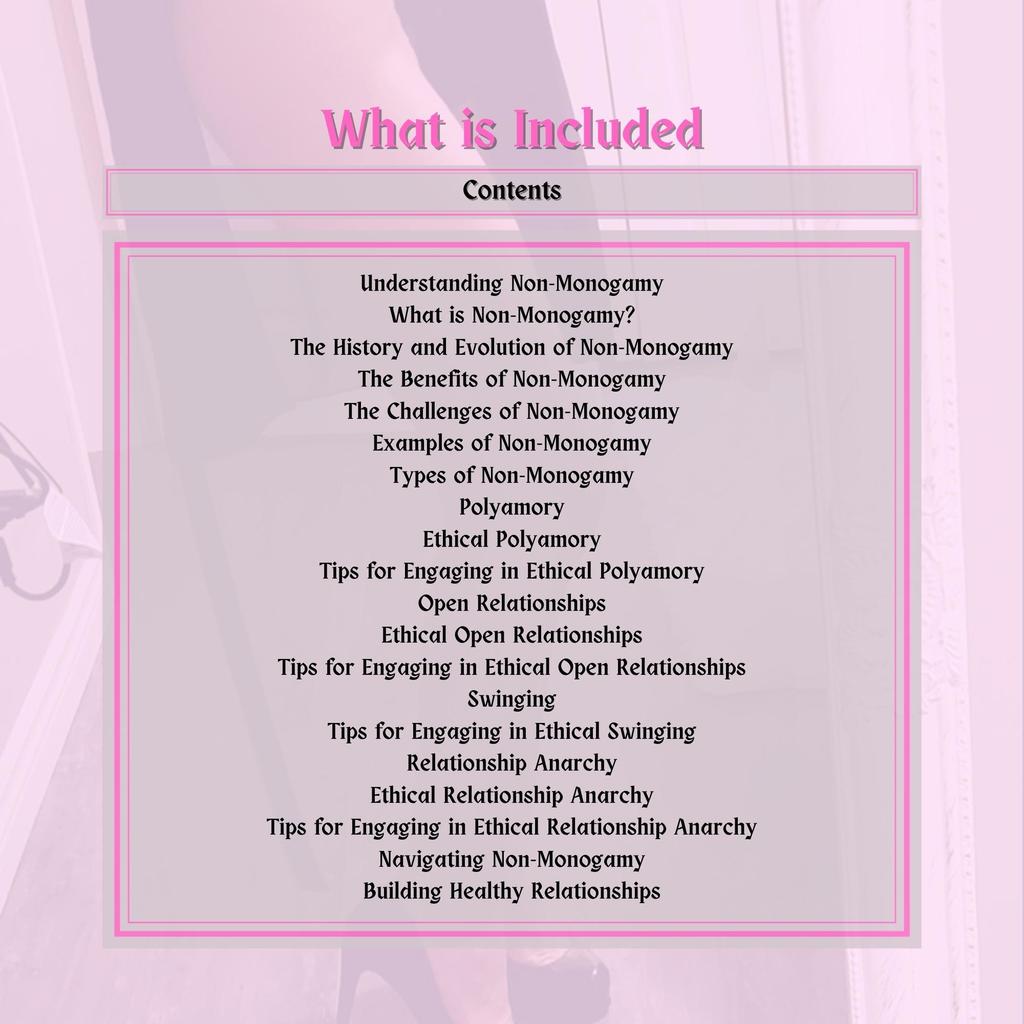Exploring Ethical Non-Monogamy, Open Relationship, Polyamory, or Swingers Lifestyle
Exploring Ethical Non-Monogamy, Open Relationship, Polyamory, or Swingers Lifestyle
Couldn't load pickup availability
Exploring Ethical Non-Monogamy (ENM) - Contents
- Understanding Non-Monogamy
- What is Non-Monogamy?
- The History and Evolution of Non-Monogamy
- The Benefits of Non-Monogamy
- The Challenges of Non-Monogamy
- Examples of Non-Monogamy
- Types of Non-Monogamy
- Polyamory
- Ethical Polyamory
- Tips for Engaging in Ethical Polyamory
- Open Relationships
- Ethical Open Relationships
- Tips for Engaging in Ethical Open Relationships
- Swinging
- Tips for Engaging in Ethical Swinging
- Relationship Anarchy
- Ethical Relationship Anarchy
- Tips for Engaging in Ethical Relationship Anarchy
- Navigating Non-Monogamy
- Building Healthy Relationships
Format
- 49 pages with information on Ethical Non-Monogamy.
- 4" x 6" Non Editable PDF.
Welcome to Exploring Ethical Non-Monogamy, your comprehensive guide to the world of non-monogamy. Whether you're new to ethical non-monogamy or an experienced practitioner, this guide has something for you. Our guide covers various topics, from the benefits and challenges of non-monogamy to the various forms it can take, including polyamory, open relationships, swinging, and relationship anarchy. We also cover important topics such as communication and consent, building healthy relationships, and exploring sexuality.
Our guide is perfect for anyone learning more about ethical non-monogamy or improving their relationships. We've included practical tips and advice to help you navigate the world of non-monogamy, including how to do it ethically and with consent. With our guide, you'll better understand non-traditional relationships and how they can work for you.
Whether you're looking to buy a gift for your hubby or exploring ethical non-monogamy for yourself, "Exploring Ethical Non-Monogamy" is the perfect guide. So, join us on this journey of self-discovery and relationship exploration, and let's explore the world of non-monogamy together!
What is Monogamy and Monogamous relationship?
Monogamy is a romantic relationship in which two people commit to each other exclusively and are sexually faithful to one another. Monogamy is a social norm in many cultures and is often associated with marriage or long-term partnerships.In a monogamous relationship, both partners have agreed to be sexually exclusive, and typically, they only engage in sexual activity with each other. Emotional and romantic exclusivity is also usually expected in monogamous relationships.
Monogamy is not the only type of romantic relationship that exists, however. Non-monogamous relationships, such as polyamory, open relationships, and swinging, are becoming more common and accepted in many cultures. These types of relationships involve consensual agreements between partners to engage in sexual or romantic relationships with others outside of the primary partnership.
Ultimately, the best relationship for any given individual or couple depends on their values, needs, and desires.
What is Non-Monogamy?
Non-monogamy refers to any romantic or sexual relationship in which the individuals involved have agreed that they may engage in sexual or romantic relationships with other people outside of the primary relationship.
Non-monogamy can take many forms, such as polyamory, open relationships, swinging, and relationship anarchy. In all cases, non-monogamy involves consensual agreements between partners to engage in sexual or romantic relationships with others.
One of the key differences between non-monogamy and traditional monogamous relationships is the emphasis on communication, honesty, and consent. In non-monogamous relationships, partners often communicate more frequently and openly about their desires, boundaries, and needs to ensure everyone involved is comfortable and happy with the arrangement.
Non-monogamy is becoming more accepted and visible in many cultures as people explore different ways of forming romantic and sexual relationships. However, it is important to note that non-monogamy is not for everyone and requires high trust, communication, and self-awareness to succeed. Ultimately, the decision to engage in non-monogamous relationships is a personal one that should be made based on individual values, needs, and desires.
What is Ethical Non-Monogamy?
Ethical non-monogamy refers to any non-monogamous relationship in which all parties involved have given informed and enthusiastic consent to engage in sexual or romantic relationships with other people outside of the primary relationship.
The term "ethical" distinguishes these types of relationships from cheating or other non-consensual non-monogamy. In ethical non-monogamy, all parties involved are aware of and agree to the nature of the relationship and are committed to upholding the agreed-upon rules and boundaries.
Ethical non-monogamy can take many different forms, including polyamory, open relationships, swinging, and relationship anarchy. In all cases, communication, honesty, and consent are essential components of a successful and ethical non-monogamous relationship.
Many people practicing ethical non-monogamy believe it allows for greater personal freedom, exploration, and growth in relationships.
Why do some people prefer nonmonogamous relationships?
There are many reasons why some people prefer non-monogamous relationships. Here are a few:
-
Variety: For some individuals, the desire for sexual or romantic variety is a primary motivator for non-monogamy. They may enjoy exploring new relationships or sexual experiences without feeling constrained by the limitations of a monogamous relationship.
-
Emotional fulfillment: While some people may feel fulfilled by a single primary partner, others may find that they can better meet their emotional needs through relationships with multiple partners.
-
Personal growth: Non-monogamous relationships can offer opportunities for personal growth and self-exploration. By navigating complex emotional situations and developing strong communication skills, individuals can better understand themselves and their partners.
-
Flexibility: Non-monogamous relationships can offer greater flexibility and freedom than traditional monogamous relationships. Individuals can negotiate their relationship structures and boundaries based on their unique needs and desires.


















